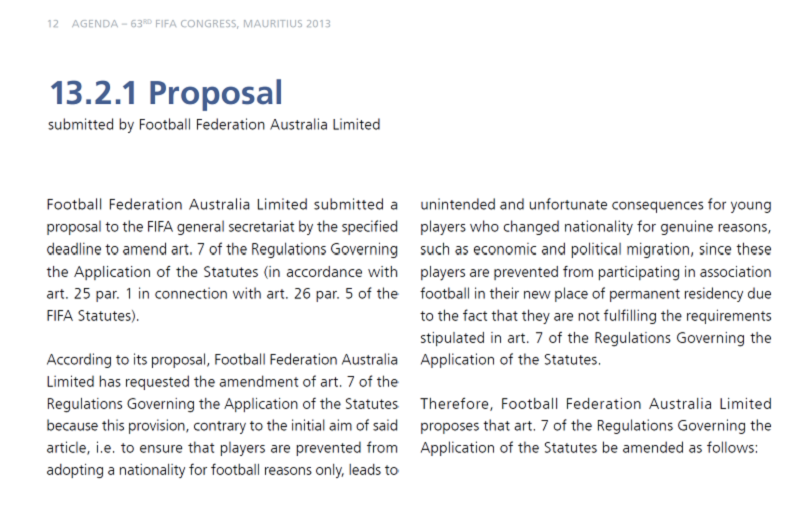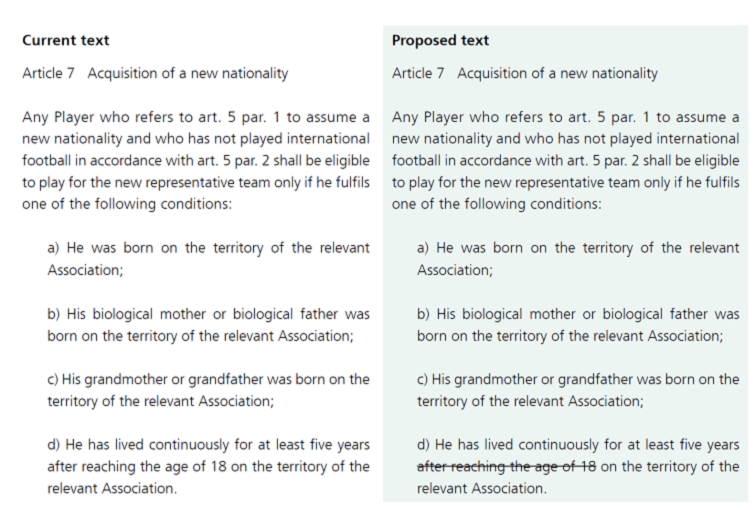Frank,
I read your piece published on The42.ie/Journal.ie in relation to NI-born Irish nationals playing for Ireland and would like to share some thoughts with you on the matter.
I wrote the following back in 2011 in order to debunk many of the myths in the mainstream media surrounding the issue and would urge you to have read:
http://playereligibilityinireland.bl...ontext-of.html
It's been four years since the Court of Arbitration for Sport gave its judgment on this, but, unfortunately, it appears many Irish people remain misinformed and ignorant of the facts and reality of the situation. Sadly, I see you have repeated one or two of these myths yourself in your piece. As a result, I am more than happy to enhance your understanding of the situation so that you can be fully informed on the matter before discussing it in front of the forthcoming British Irish Parliamentary Assembly.
First of all, the GFA has nothing to do with this in substance and insofar as footballing eligibility is governed by FIFA's Regulations Governing the Application of the Statutes. Article 5.1 of those regulations states:
"Any person holding a permanent nationality that is not dependent on residence in a certain country is eligible to play for the representative teams of the Association of that country."
In principle, Irish nationals born north of the border have been eligible to play for the FAI for so long as the entitlement to Irish nationality has been island-wide. Or since 1956, more precisely, with the passing of the Irish Nationality Act 1956. As far back as 1946, the rule governing international footballing eligibility, Art. 21 al. 2 of the Regulations of the FIFA, stated:
“The players (NB. of International Matches) must be selected by the National Associations concerned and be subjects of the country they represent”.
Thankfully, there is a greater awareness of the rules and rights of players nowadays, but, sadly, this was not always the case. Some further information here on how Harry Cavan and the IFA denied northern-born Irish nationals, such as Jimmy McGeough, from representing Ireland in the past:
http://www.the42.ie/profile/30794/ir...y-fai-3477859/
To the present day, however; the reason northern-born Irish nationals declare for Ireland is because they identify with the independent Irish national identity that is officially channeled through the Irish state. They are as much legal citizens of the Irish nation as you are. Depriving players of the choice to play for their country and compelling or forcing them to play for another association with whom they don't identify does nothing to aid relations or reconciliation. Recognition and respect for/tolerance of identity and difference is necessary for genuine reconciliation, as is recognised and encouraged by the GFA that you are keen to cite.
This situation has already been looked at in great detail by both FIFA and the CAS in the case of Belfast-born Daniel Kearns (
http://web.archive.org/web/201107210...ard%202071.pdf). The CAS ruled in the FAI's favour in that case. You might be surprised to note that the IFA had already rejected a compromise offer from FIFA that the FAI were happy to accept by then.
The FAI simply facilitate Irish nationals who are willing and good enough to play for their country. Those players from the north who declare for the FAI make that decision themselves, as is their right protected by FIFA rules. To deprive them of this right by way of governmental intervention or an internal/informal agreement between the FAI and the IFA would be to contravene FIFA's rules, which apply universally and uniformly to the FAI and every other association.
If their public utterances are to be believed, the IFA have since come to terms with rules and have acknowledged the right of Irish nationals to play for their country. Indeed, the IFA have also benefited from FIFA's allowance for players to switch association once (the rule under which northern-born players can switch from the IFA to the FAI). Alex Bruce, for example, played for the FAI (at senior level) before switching to the IFA. He is not the only case.
The prospect of an all-unionist/Protestant community NI team simply hasn't transpired either since the headline cases a few years ago, nor is there any indication it will. To suggest there is "a very real danger that both international football teams on the island might come to represent almost exclusively Nationalist and Unionist communities" is simply baseless scaremongering. Where is your evidence for this? Plenty of players from Catholic or nationalist backgrounds (Niall McGinn, for example) still play for the IFA and will do so in the future.
As to why I think northern-born players representing the FAI is a relatively recent phenomenon, here is another piece I wrote offering further thoughts on that:
http://backpagefootball.com/so-what-...for-fai/34570/
I hope you will take all of the above on board in order to better inform yourself on this matter before your co-chairing of the British Irish Parliamentary Assembly.
Regards,
DI.








 Quote
Quote







Bookmarks